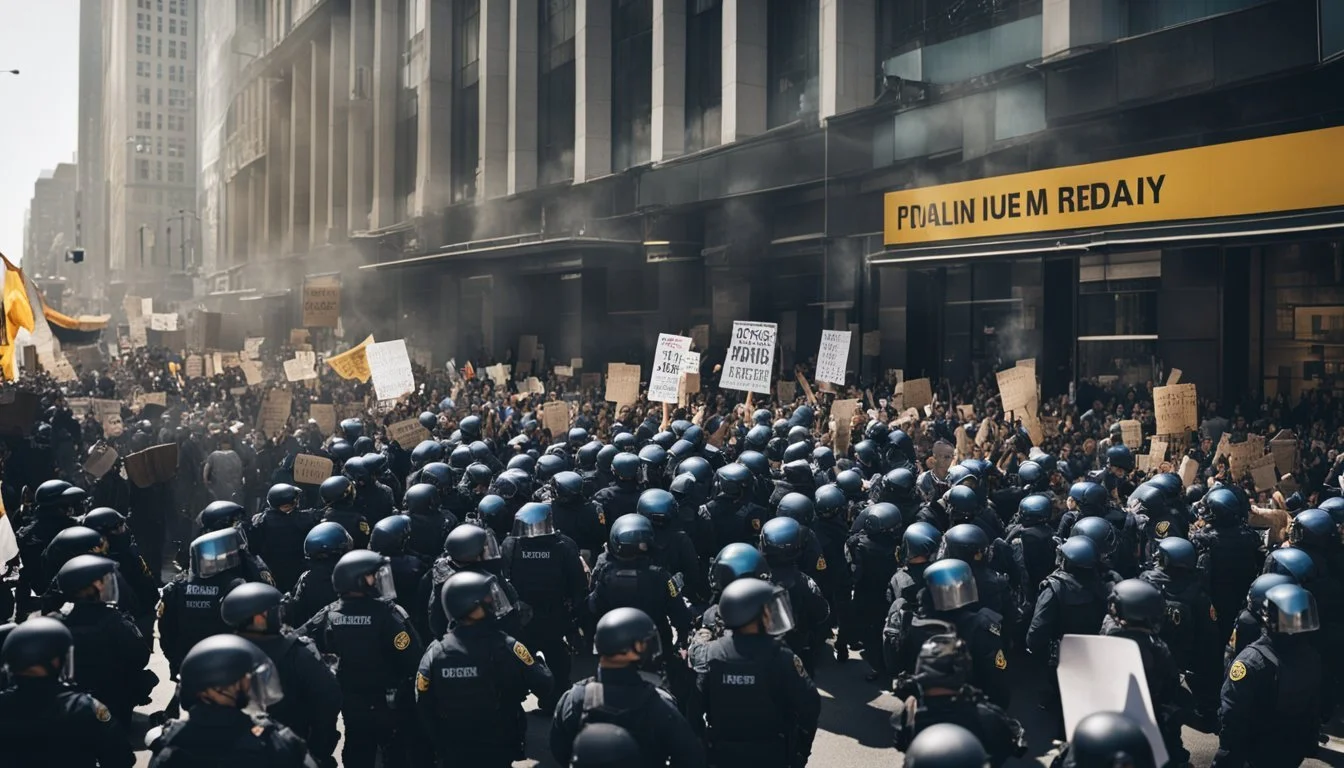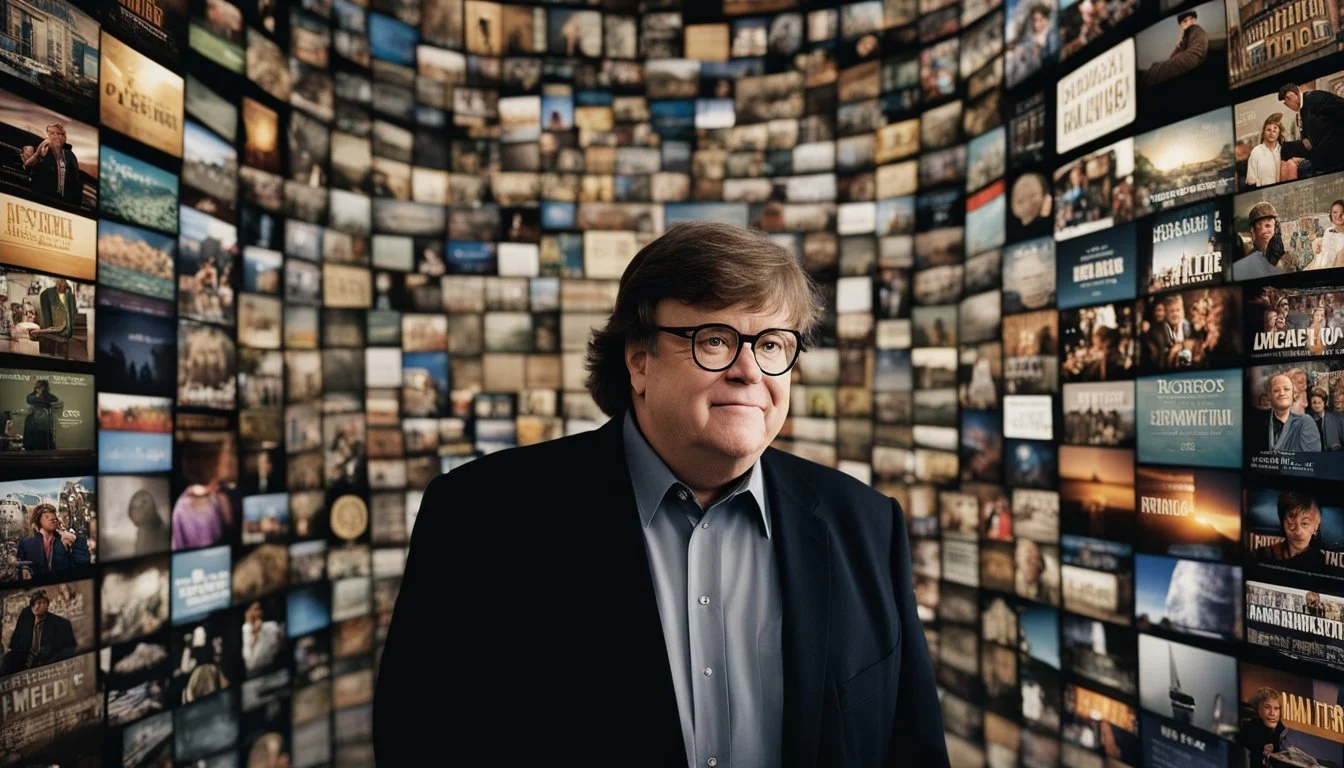Michael Moore: Provocateur Extraordinaire
Holding a Mirror to Society
Michael Moore stands as one of the most influential documentary filmmakers and political commentators of our time. Through films like "Fahrenheit 9/11" and "Sicko," he uses his platform to challenge the status quo and provoke thought on pressing societal issues. His approach combines compelling narratives with a sharp critique of social and political systems, making his work both engaging and informative.
Moore's unique style of blending humor with serious commentary captivates audiences while shedding light on often overlooked injustices. His encounters with politicians, celebrities, and everyday people reveal the complexities of contemporary issues, from healthcare reform to government transparency. By doing so, he not only entertains but also educates, urging viewers to question and understand the world around them.
Whether through his documentaries or his public appearances, Moore consistently draws attention to the power dynamics that shape society. His commitment to social justice and fearless confrontation of controversial topics have earned him both acclaim and criticism. His work remains a crucial mirror, reflecting the truths and contradictions inherent in modern life.
Michael Moore: Early Life and Education
Michael Francis Moore was born on April 23, 1954, in Flint, Michigan. His parents, Helen Veronica, a secretary, and Francis Richard Moore, an automotive assembly-line worker, provided a typical middle-class upbringing. Flint, a city known for its close ties to the automotive industry, played a significant role in shaping Moore's perspectives.
During his school years, Moore displayed a keen interest in politics and social issues. At the age of 18, he was elected to the Flint school board, making him the youngest person to hold an office of that magnitude in the United States at the time.
Moore attended Davison High School, where he was active in both the drama and debate clubs. His passion for public speaking and performing arts became evident early on. After graduating from high school, Moore briefly attended the University of Michigan-Flint but did not complete his degree.
His early experiences in Flint, particularly witnessing the automotive industry's decline, profoundly influenced his future work. These formative years instilled in him a desire to challenge corporate practices and advocate for social justice.
Moore’s upbringing in Flint, combined with his involvement in local politics, provided a foundation for his later work as a filmmaker and activist. He demonstrated early on an ability to engage with pressing social issues and a drive to make a difference in his community.
Rise to Prominence
Michael Moore became a prominent figure by challenging social and political norms through documentaries and television. His keen eye for highlighting societal issues garnered him widespread attention and acclaim.
Roger & Me: The Breakthrough
Michael Moore's rise began with Roger & Me in 1989. This groundbreaking documentary chronicles the economic impact of General Motors' plant closures in Flint, Michigan. Using a mix of satire and earnest storytelling, Moore follows his attempts to interview GM CEO Roger Smith.
The film's unique blend of humor and stark realism brought critical acclaim and commercial success. It earned Moore a reputation for bringing attention to the struggles of working-class Americans, marking his entry into mainstream recognition. Moore’s role as both narrator and pursuer in the quest to hold corporate leadership accountable resonated widely with audiences.
Television and 'TV Nation'
Expanding beyond documentaries, Michael Moore ventured into television. He created TV Nation in 1994, a satirical newsmagazine show. The program aimed to inform viewers on various social and political issues through a mix of humor and investigative reporting.
TV Nation aired on NBC and later on the Fox Network. It featured segments on offbeat topics and interviews with ordinary people affected by systemic problems. The show further cemented Moore's reputation as a provocateur willing to challenge the status quo. Despite its short run, TV Nation earned an Emmy Award for Outstanding Informational Series, showcasing Moore’s ability to engage viewers beyond the silver screen.
Documentary Style and Techniques
Michael Moore's documentaries are known for their controversial narration, personal approach, and an effective blend of archival footage with witty humor.
Controversial Narration and Satire
Michael Moore brilliantly uses controversial narration to captivate his audience. His satirical humor, as noted in his documentary Sicko (2007), exposes flaws in the American healthcare system.
By using irony and sarcasm, he makes complex issues understandable, compelling the viewer to rethink their assumptions. This approach not only entertains but also provokes thought, making serious subjects accessible.
Personal Approach in Filmmaking
Moore often inserts himself into his films, creating a personal connection with the audience. This style allows viewers to see the narrative through his eyes, providing a relatable and engaging perspective.
In Roger & Me (1989), Moore’s personal quest to confront General Motors’ CEO humanizes the broader economic issues. His approach bridges the gap between the subject matter and the audience, fostering a deeper emotional connection.
Use of Archival Footage and Humor
Crafting his narratives with archival footage, Michael Moore gives historical context and authenticity to his documentaries. The footage is often juxtaposed with humorous commentary, enhancing the impact of his message.
In Fahrenheit 9/11 (2004), the archival clips are paired with Moore’s witty narrations, blending humor with poignant criticism. This technique not only underscores his points but also makes the content engaging and memorable.
Major Works and Themes
Michael Moore's documentaries critically examine various socio-political issues and power structures in America. His works often mix sharp humor with investigative journalism to explore pressing national concerns from gun violence to economic inequality.
Bowling for Columbine and Gun Culture
Bowling for Columbine (2002) delves into America's deeply rooted gun culture and the epidemic of gun violence. Using poignant interviews and archival footage, Moore explores the reasons behind the shocking rates of gun-related deaths in the United States. Noteworthy moments include Moore's visit to Columbine High School and his interview with NRA president Charlton Heston, confronting him with the consequences of his organization's policies. The documentary won an Academy Award for Best Documentary Feature, cementing Moore’s reputation for tackling tough issues.
Fahrenheit 9/11 and Political Critique
Fahrenheit 9/11 (2004) critically examines the presidency of George W. Bush and the U.S. government's actions following the September 11 attacks. By investigating the links between the Bush administration and the Saudi Arabian government, Moore raises questions about political motivations behind the Iraq War. The film's candid approach includes footage from Iraq and interviews with soldiers, policymakers, and citizens. Fahrenheit 9/11 won the Palme d'Or at the Cannes Film Festival, becoming the highest-grossing documentary of all time and provoking widespread debate.
Sicko and Health Care Analysis
Sicko (2007) scrutinizes the American healthcare system, contrasting it with models in other countries such as Canada, the UK, and France. Moore highlights the struggles ordinary Americans face in a profit-driven healthcare landscape, featuring emotional stories from individuals denied necessary treatments. By comparing these personal narratives with the more accessible healthcare systems abroad, Moore underscores the inefficiencies and ethical issues inherent in the U.S. model. This film reaffirmed Moore’s knack for humanizing complex policy debates.
Capitalism: A Love Story and Economic Commentary
Capitalism: A Love Story (2009) critiques the economic practices and policies leading to the 2008 financial crisis. Moore addresses the impact of corporate greed on American workers, showcasing devastating personal stories of foreclosures, job losses, and economic despair. He also investigates the bailout of major banks and its implications for the middle class. Through dramatic interviews and bold investigative segments, Moore draws a damning portrait of capitalism's failings, advocating for economic reform and social justice.
Each documentary by Michael Moore seeks to provoke thought and catalyze discussion on critical societal issues, using a combination of factual reportage and compelling storytelling.
Impact and Influence
Michael Moore has left an indelible mark on documentary filmmaking, changing the way audiences perceive and engage with social and political issues. His work garners critical acclaim and sparks debates, influencing both creators and viewers alike.
Awards and Accolades
Michael Moore's filmography has garnered numerous awards, underscoring his significant impact on the documentary genre. His breakthrough film, Roger & Me, won major awards at the Sundance Film Festival in 1989. Bowling for Columbine earned him an Academy Award for Best Documentary in 2003, reflecting its immense critical acclaim.
His provocative style and searing commentary earned Fahrenheit 9/11 the Palme d'Or at the Cannes Film Festival in 2004. Moore's ability to engage audiences and critique societal structures has made him one of the most decorated documentary filmmakers of his time.
Influence on Documentary Filmmaking
Moore's influence on documentary filmmaking is profound, as he redefined the genre's boundaries. Utilizing a personal approach and blending humor with hard-hitting political commentary, he made documentaries more accessible to mainstream audiences. His techniques, such as the use of first-person narration and confrontational interviews, became hallmarks of his style.
Subsequent documentary filmmakers have been inspired by Moore's methods, often adopting similar strategies to convey their messages. This shift has broadened the scope of documentaries, making the genre more dynamic and influential in public discourse.
Public and Critical Reception
Public and critical reception of Michael Moore's work has been mixed but undeniably impactful. While many praise his ability to highlight pressing social issues, others criticize his methods as sensationalist. Sicko, for instance, was lauded for exposing flaws in the American healthcare system yet faced backlash for its perceived partiality.
Despite the polarized opinions, Moore's films often generate significant conversation and media coverage. This engagement underscores his role in pushing societal debates, demonstrating his powerful influence on both popular culture and policy discussions.
Criticism and Controversies
Michael Moore has never shied away from contentious topics, causing substantial debate about his work. The issues often revolve around the accuracy of his claims, ethical concerns, and responses from those he critiques.
Accuracy and Objectivity
Moore's documentaries are frequently criticized for their perceived lack of objectivity and manipulation of facts. Critics argue that his films sometimes present misleading information to support his viewpoint. For instance, Planet of the Humans has been accused of perpetuating outdated and inaccurate myths about clean energy.
Many argue that Moore's framing and selective use of data oversimplify complex issues. Despite this, his films continue to spark significant discussion, reflecting societal concerns.
Legal and Ethical Issues
Moore has faced legal challenges and ethical questions throughout his career. In some cases, subjects featured in his movies have sued him for defamation or misrepresentation. For example, Roger & Me drew attention for ethical concerns surrounding how interview subjects were portrayed.
Additionally, Moore's tactics, such as ambushing interviewees or selectively editing footage, raise ethical questions. These methods have led to debates about the line between provocative filmmaking and journalistic malfeasance.
Public Figures and Backlash
Moore often targets prominent public figures and corporations, provoking strong reactions. His film Fahrenheit 9/11, which critiques the Bush administration's response to the 9/11 attacks, sparked significant backlash. Many conservatives accused Moore of unpatriotism and spreading misinformation.
Public reactions to his work are polarized. Some praise him for courageously confronting powerful entities, while others dismiss his films as one-sided and sensationalist. These varied responses highlight the divisive nature of his work and its impact on public discourse.
Personal Life and Activism
Michael Moore, a renowned filmmaker and social activist, has consistently used his platform to challenge societal norms and advocate for change. Born on April 23, 1954, in Flint, Michigan, Moore grew up witnessing the decline of the American auto industry, which profoundly influenced his career and activism.
Family and Early Life
Moore's upbringing in a working-class family instilled in him a strong sense of justice and equity. His parents, Virginia and Frank Moore, were both factory workers. This environment shaped his views on labor rights and economic disparity.
Career and Activism
Moore’s first major breakthrough came with his 1989 documentary, Roger & Me. The film critiqued General Motors CEO Roger Smith's decision to close several auto plants, highlighting the devastating impact on Flint’s residents.
Notable Works
Bowling for Columbine (2002): Examines gun violence in America.
Fahrenheit 9/11 (2004): Critiques the Bush administration's response to the 9/11 attacks.
Sicko (2007): Investigates the American healthcare system.
Each documentary not only gained critical acclaim but also sparked significant public discourse.
Humanitarian Efforts
Moore’s activism extends beyond filmmaking. He has been involved in various humanitarian efforts, supporting causes like healthcare reform and workers' rights. He often participates in public protests and uses social media to mobilize support.
Backlash and Controversy
Despite his successes, Moore has faced backlash. His outspoken nature and controversial opinions have drawn criticism from various quarters. Nevertheless, he remains undeterred, continuing to use his influence to advocate for social justice.
Moore's personal experiences and commitment to activism underpin much of his work, making him a distinctive voice in contemporary discourse.
Michael Moore's Public Image
Michael Moore's public image is that of an unflinching provocateur who challenges the status quo. Known for his bold documentaries, he frequently addresses controversial topics with a distinctive style that combines humor and investigative journalism.
Key Characteristics:
Outspoken: Never one to shy away from voicing his opinions, Moore often addresses social, political, and economic issues head-on.
Humorous: His films and public appearances are often laced with humor, making complex topics more accessible.
Controversial: Some see his work as polarizing due to his strong opinions and methods of delivery.
Influence:
Media Presence: Moore has been a frequent guest on talk shows and news programs, where his views spark debate.
Impact on Audiences: His films resonate with a wide audience, influencing public opinion and stimulating discussion on critical issues.
Reception:
Critics and Supporters: While some critics argue that Moore's work is biased, his supporters praise him for highlighting important societal issues.
Awards and Recognition: His work has earned him several accolades, including an Academy Award for "Bowling for Columbine."
Despite his critics, Moore's contributions to documentary filmmaking and public discourse remain significant.
Future Projects and Endeavors
Michael Moore continues to push boundaries with his upcoming projects. Known for his unapologetic and critical approach, Moore's future endeavors promise to be as impactful as his previous works.
One anticipated project involves a focus on youth activism. Moore plans to document the Great 2024 Nonviolent Student Uprising, showcasing the voices and efforts of a new generation fighting against injustices.
He is also exploring new platforms for his commentary. Moore's podcast, Political Science Theater 3000, involves engaging discussions with diverse guests, including comedians, politicians, and everyday people. This platform allows him to reach new audiences and share unfiltered opinions.
In the realm of film, Moore may be working on another provocative documentary. Following the success of Where to Invade Next, he aims to tackle current political and social issues with his signature mix of humor and incisiveness.
Moore’s engagement with digital media continues to expand. Through social media campaigns and interactive online content, he seeks to involve his audience more directly in dialogues on pressing societal issues.
As always, Moore’s projects will likely stir conversations and encourage critical reflections on the state of the world.







